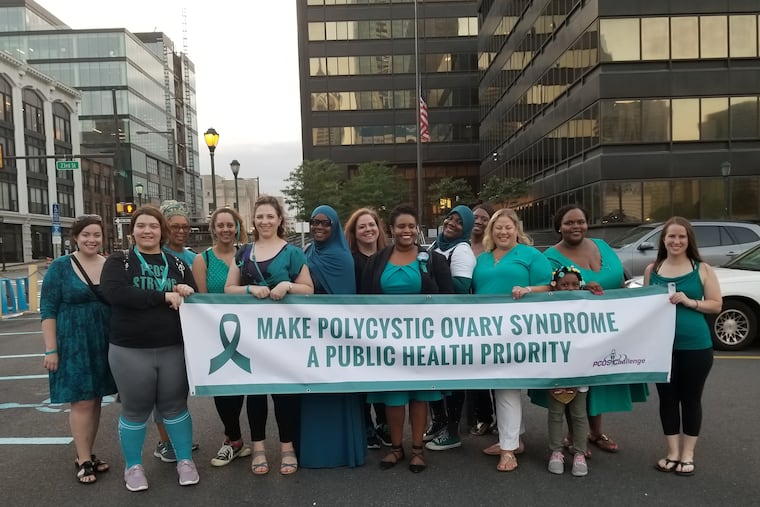PCOS raises the risk of getting COVID-19. Women with the complex disorder are pushing for research.
A huge potential risk factor for COVID-19 has gotten almost no scientific attention.

In March, an advocacy group for women with polycystic ovary syndrome lobbied Congress to encourage research on PCOS and COVID-19.
At that point, a year after the pandemic hit the United States, no one had studied whether PCOS — which affects at least 1 in 10 women worldwide — increases vulnerability to COVID-19, or to life-threatening complications, or both.
However, the idea made sense. PCOS is a complex metabolic and endocrine disorder that is linked to a variety of chronic conditions, including obesity, diabetes, high blood pressure, heart disease, and asthma. Federal health agencies warn that each of those conditions can make COVID-19 more devastating, as can cancer, HIV infection, dementia, and sickle-cell disease. Yet PCOS is not mentioned in high-risk groups.
“I don’t think there’s anything scarier than what we’ve all been through in the last year,” said Sasha Ottey, founder of PCOS Challenge: The National Polycystic Ovary Syndrome Association, which led the lobbying effort. “But the overlap of risk factors for PCOS and severe COVID-19 outcomes should be alarming and spark interest. It’s just going unrecognized and, frankly, ignored.”
Last month, a study by United Kingdom researchers sounded an alarm, finding that women with PCOS were 51% more likely to get COVID-19 than age-matched women without the syndrome. That elevated risk persisted after the researchers made statistical adjustments to be sure PCOS — not accompanying chronic conditions — was the culprit; PCOS patients still had a 28% higher chance of infection.
The study, published in the European Journal of Endocrinology, could not assess COVID-19 severity because it was based on primary care medical records from the first wave of the pandemic. About 21,000 PCOS patients were compared with 78,000 women without the syndrome, matched for age and location.
“This is the first publication since the pandemic outbreak that has demonstrated an increased susceptibility to COVID-19 infection in women with PCOS,” wrote the University of Birmingham researchers. “Given the high prevalence of PCOS in the population, these findings need to be considered when designing public health policy and advice as our understanding of COVID-19 evolves.”
That point of view was echoed by the Bipartisan Congressional PCOS Caucus, formed in 2018 in partnership with PCOS Challenge and cochaired by Rep. Brian Fitzpatrick (R., Pa.).
In an April letter urging federal funding of research into PCOS and COVID-19, the caucus wrote: “Findings should be disseminated to health care providers, PCOS patients, the general public, as well as highlighted for clinical practice.”
Common and complex
Exactly what causes PCOS remains unclear, but it may be rooted in one or more genetic flaws. While the severity of PCOS varies, a diagnostic hallmark is excessive male hormones, particularly testosterone. This prevents or disrupts ovulation — which may or may not lead immature eggs to form cysts in the ovaries.
Symptoms may include irregular periods, obesity, male-pattern hair growth or hair loss, acne, and infertility. Over time, complications may include depression, endometrial cancer, and metabolic abnormalities such as diabetes.
The complexity of PCOS was not appreciated when it was first described in 1935 by two American gynecologists, who believed it to be a rare reproductive disorder. Now, even the name is debated, because experts realize that some women with the syndrome don’t have ovarian cysts, and some with cysts don’t have the syndrome.
“I want a precise name. I don’t like the name. But changing the name is controversial,” Katherine Sherif, a PCOS specialist at Thomas Jefferson University, told The Inquirer in 2018. “A reason to keep the name is that physicians and women are finally becoming more aware of what it is.”
Still, Sherif and other experts lament that PCOS remains understudied, underfunded, and underdiagnosed — and the pandemic has only made the situation worse.
“My advice would be to include women with PCOS as ... potentially a high-risk group,” Sherif told CNN last month. “But we’re working in a very large system that is full of silos. Nobody’s going to jump up and say, ‘Oh, well, don’t forget about PCOS.’ If Anthony Fauci said, ‘You need to look at the high-risk groups like PCOS,’ people might pay more attention.”
Why might PCOS be an independent risk factor for an illness that starts as a respiratory infection? Experts have clues and hunches. COVID-19 is more common in men than women, and animal studies suggest the reason is male hormones, which are elevated in women with PCOS. Also, PCOS causes an exaggerated, body-wide inflammatory response, which is also characteristic of severe COVID-19.
Ottey, of Atlanta, is a former microbiologist who founded PCOS Challenge after her own diagnosis 13 years ago. She dodged COVID-19 by rigorously following pandemic precautions such as masking. She is now fully vaccinated.
But on social media, members of her group — more than 50,000 strong — share anecdotes suggesting the pandemic has taken a particularly awful toll on their community.
“We don’t know,” Ottey said. “But we need to know.”